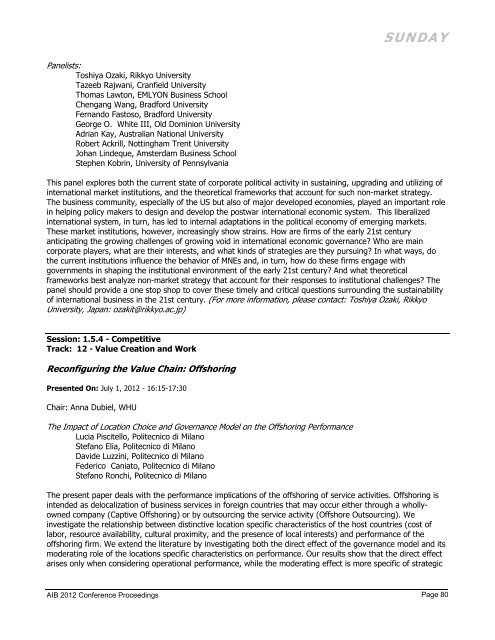AIB 2012 Conference Proceedings - Academy of International ...
AIB 2012 Conference Proceedings - Academy of International ...
AIB 2012 Conference Proceedings - Academy of International ...
Create successful ePaper yourself
Turn your PDF publications into a flip-book with our unique Google optimized e-Paper software.
SUNDAY<br />
Panelists:<br />
Toshiya Ozaki, Rikkyo University<br />
Tazeeb Rajwani, Cranfield University<br />
Thomas Lawton, EMLYON Business School<br />
Chengang Wang, Bradford University<br />
Fernando Fastoso, Bradford University<br />
George O. White III, Old Dominion University<br />
Adrian Kay, Australian National University<br />
Robert Ackrill, Nottingham Trent University<br />
Johan Lindeque, Amsterdam Business School<br />
Stephen Kobrin, University <strong>of</strong> Pennsylvania<br />
This panel explores both the current state <strong>of</strong> corporate political activity in sustaining, upgrading and utilizing <strong>of</strong><br />
international market institutions, and the theoretical frameworks that account for such non-market strategy.<br />
The business community, especially <strong>of</strong> the US but also <strong>of</strong> major developed economies, played an important role<br />
in helping policy makers to design and develop the postwar international economic system. This liberalized<br />
international system, in turn, has led to internal adaptations in the political economy <strong>of</strong> emerging markets.<br />
These market institutions, however, increasingly show strains. How are firms <strong>of</strong> the early 21st century<br />
anticipating the growing challenges <strong>of</strong> growing void in international economic governance Who are main<br />
corporate players, what are their interests, and what kinds <strong>of</strong> strategies are they pursuing In what ways, do<br />
the current institutions influence the behavior <strong>of</strong> MNEs and, in turn, how do these firms engage with<br />
governments in shaping the institutional environment <strong>of</strong> the early 21st century And what theoretical<br />
frameworks best analyze non-market strategy that account for their responses to institutional challenges The<br />
panel should provide a one stop shop to cover these timely and critical questions surrounding the sustainability<br />
<strong>of</strong> international business in the 21st century. (For more information, please contact: Toshiya Ozaki, Rikkyo<br />
University, Japan: ozakit@rikkyo.ac.jp)<br />
Session: 1.5.4 - Competitive<br />
Track: 12 - Value Creation and Work<br />
Reconfiguring the Value Chain: Offshoring<br />
Presented On: July 1, <strong>2012</strong> - 16:15-17:30<br />
Chair: Anna Dubiel, WHU<br />
The Impact <strong>of</strong> Location Choice and Governance Model on the Offshoring Performance<br />
Lucia Piscitello, Politecnico di Milano<br />
Stefano Elia, Politecnico di Milano<br />
Davide Luzzini, Politecnico di Milano<br />
Federico Caniato, Politecnico di Milano<br />
Stefano Ronchi, Politecnico di Milano<br />
The present paper deals with the performance implications <strong>of</strong> the <strong>of</strong>fshoring <strong>of</strong> service activities. Offshoring is<br />
intended as delocalization <strong>of</strong> business services in foreign countries that may occur either through a whollyowned<br />
company (Captive Offshoring) or by outsourcing the service activity (Offshore Outsourcing). We<br />
investigate the relationship between distinctive location specific characteristics <strong>of</strong> the host countries (cost <strong>of</strong><br />
labor, resource availability, cultural proximity, and the presence <strong>of</strong> local interests) and performance <strong>of</strong> the<br />
<strong>of</strong>fshoring firm. We extend the literature by investigating both the direct effect <strong>of</strong> the governance model and its<br />
moderating role <strong>of</strong> the locations specific characteristics on performance. Our results show that the direct effect<br />
arises only when considering operational performance, while the moderating effect is more specific <strong>of</strong> strategic<br />
<strong>AIB</strong> <strong>2012</strong> <strong>Conference</strong> <strong>Proceedings</strong><br />
Page 80

















